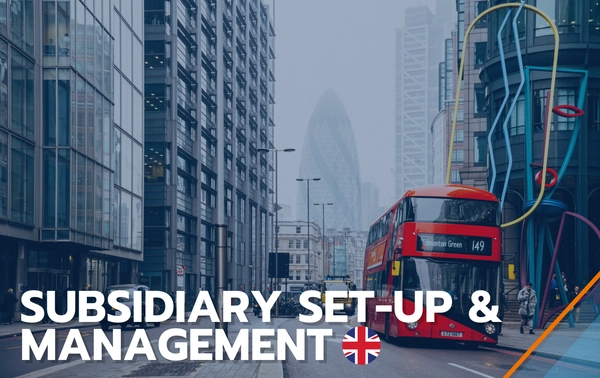Incorporating a company
Setting up a subsidiary in the UK is relatively straight forward and can be done within 24 hours.
The four main types of legals entities are:
- Sole Trader
- Partnership
- Public Limited Company (PLC)
- Limited Company (Ltd)
The most common format used for small to medium companies looking to set up a subsidiary in the UK is the Limited Company (Ltd).
How is a company incorporated and how long does the process take?
Company incorporation can be done within 24 hours in the UK. There are five key elements you need:
- Company Name & email address
- Registered Office
- Appoint Director(s) – must have at least one director though they do not have to be based in the UK
- Appoint Shareholder(s) – must have at least one shareholder and it can be the mother company
- Share Capital – minimum share capital needed is £1
Part of the incorporation process involves establishing articles of association and memorandum of association; these are legal documents that outline the company’s structure and rules for running the company.
It also involves identifying who the PSCs (Person of Significant Control) of the subsidiary will be. Companies House now requires all companies to be able to identify, where possible and relevant, an ultimate Person(s) of significant Control. A Person of significant control is defined as:
- Anyone who will own or control more than 25% of shares (directly or indirectly), or
- Anyone who holds more than 25% of the voting rights
In the case where a foreign entity controls the UK subsidiary with 100% of the shares, we will need to identify the PSCs of the shareholding company.
For example, in the case where the UK subsidiary (Company A) is owned 100% by the foreign mother company (Company B), we will need to identify who owns more than 25% of the shares of Company B and list these with Companies House.
Once the company has been created, you can proceed with the following steps to complete incorporation:
1. Corporation Tax registration: Once your company is registered with Companies House, you will need to register for Corporation Tax with HM Revenue and Customs (HMRC) and obtain a UTR (Unique Tax Reference) Number.
- Register for VAT and EORI (if applicable) : If your business is expecting a turnover of over £90,000 over a rolling 12-month period, you will have to register for VAT. Acquiring a VAT number can take anywhere from a couple of weeks to two months to obtain.
An EORI number (Economic Operator Registration and Identification Number) is used for customs purpose in the EU and is a compulsory if you are engaging in cross-border trade.
- Open a local bank account: This is by far the lengthiest part of the incorporation process and can be extremely challenging to do in the UK, taking around 3-6 months to achieve.
Ongoing obligations for a UK company
There are various ongoing obligations for UK registered companies:
- Filing annual accounts with Companies House
- Submission and payment of Corporation Tax
- File a Confirmation Statement with Companies House -> this confirms to Companies House various details about the company including the Directors, Shareholders, any changes to Share Capital and the SIC (Standard Industrial Classification) code which describes the company’s activities
Other considerations
A Company Secretary -> whilst not an obligation to name a specific individual for this role, the various tasks undertaken by the company secretary must be completed. These include, but are not limited to, filing the annual confirmation statement with Companies House, maintaining the company’s statutory registers, and ensuring compliance with relevant laws and regulations.
Audited annual accounts -> your UK subsidiary might have to be audited if at a group level you fulfil any two of the following three criteria:
- Over 50 employees
- £10.2 million in turnover
- £5.1 million in total assets
Corporation Tax : Corporation tax in the UK for company profits is currently at 25%, or 19% if your company made £50,000 profit or less.








